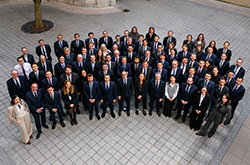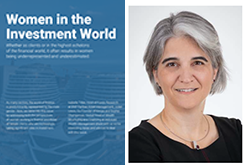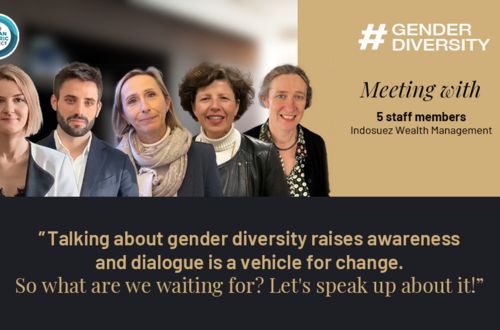Interview with Rebecca Marti, Chief of Staff, Azqore
Tell us about your job and its role within the organisation. What are the main highlights of your activity over the year?
I am currently working on the Optima programme as Chief of Staff. This transformation programme aims to deliver Azqore's services to Société Générale Private Banking in Luxembourg, Monaco and Switzerland and to the Kleinwort Hambros Group (KH), based in London. Beyond a simple migration project, it is a strong partnership between Société Générale, Indosuez and Azqore aiming to enhance and mutualise the current S2i platform. The Chief of Staff team coordinates and paces the programme. It ensures the proper monitoring of governance, planning, interdependencies with other projects, budget and resources.
What is your career path? How have you managed the different developments in your career?
After a master's degree in Market Finance, I did an internship at the HSBC Paris trading room in 2008. Later, I moved to Luxembourg to join the creation of an OTC middle-office at RBC IS (ex RBC Dexia). With a 6-year experience on fund migration projects and on the implementation of complex processes in a growing regulatory context, I then switched to Consulting in order to gain as much experience as possible. For 5 years, I had the opportunity to manage and participate in multiple regulatory, organisation and strategic projects in Luxembourg, London, Paris, Monaco and Zurich within investment banks, custodian banks and private banks. Afterwards, I joined the Consulting team at Azqore in Lausanne, with a first mission consisting in working on the value proposition for Société Générale Private Banking.
Was being a woman an asset or handicap in your career? How do you manage your personal and professional life?
Until now, I have not had to ask myself this question. I have been pampered by my all superiors, men and women. I personally believe in the virtues of work and individual personalities, regardless of gender.
As far as managing my personal and professional life, I manage like everyone else I believe - according to the priorities of the moment which change depending on personal goals, professional opportunities and family events.
How do you view the evolution within our Group regarding gender diversity? In concrete terms, what initiatives do you and your teams take on a daily basis to make progress in the area of gender diversity?
We need to take the debate out of the equation and see it through the prism of data. It's been 40 years since the elite universities were opened to women, ensuring a rate of over 50% upon graduation from business schools and we undeniably see a 30% glass ceiling in executive committees. Yet, according to the 2019 Skema Observatory study on the feminisation of companies, we notice that CAC 40 listed companies with at least 40% of female executives show a +240% growth in the stock market compared to +43% for the CAC 40 in general between 2009 and 2019.
The new generation tends to think that there is no longer any difference in treatment, whether in terms of pay or in the appointment for positions of high responsibility. Unfortunately, the HR situation is different.
We need to make progress in 3 areas:
- Dare to work in gender diversity in order to extend it at all levels ;
- Make sure that the women’s talent pool is maintained between graduating from business schools and the major family life events ;
- Ensure inclusion, i.e., equity in management positions up to the Executive Committee.
What advice would you give to the younger generation?
We work in administrations whose operations are being shaken up and must adapt to meet the challenges of the new world. Gender equality is among the cultural developments underway that are crucial for transformation. Everyone must be aware that they are a catalyst for change. Pericles said: "If you want something you have never had, you must be willing to do something you have never done".
08 settembre 2021




